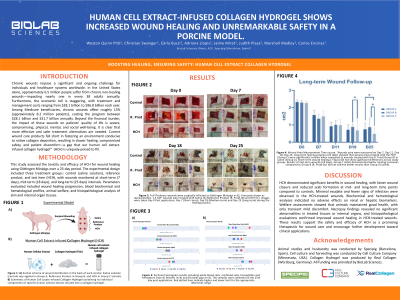Laboratory Research
(LR-038) Human Cell Lysate-infused Collagen Hydrogel* Shows Increased Wound Healing and Unremarkable Safety in a Porcine Model
Friday, May 2, 2025
7:45 PM - 8:45 PM East Coast USA Time

Carla Buzzi, Msc – Veterinarian Technician, Specipig; Adriana Llopis, Msc – Study Director, Specipig; Jaime Miret, MVD – Experimental Manager, Specipig; Judith Plaza, PhD – Study Director, Specipig; Marshall Medley, DO, FACOS, CWS-P – Chief Medical Officer, Biolab Holdings; Carlos Encinas, PhD – Chief Scientific Officer, Biolab Holdings
Introduction:
Chronic wounds represent a significant burden on both individuals and healthcare systems worldwide. Affecting approximately 6.5 million people in the United States alone, these non-healing wounds impact about 1 in 38 adults annually (1). The economic toll is staggering, with annual management costs estimated between $28.1 billion and $96.8 billion (1). In the Medicare population, chronic wounds affect nearly 15% of beneficiaries (8.2 million), costing the program an estimated $28.1 to $31.7 billion annually (2). Beyond the financial impact, chronic wounds significantly diminish patients' quality of life, affecting physical function, psychological well-being, and social interactions (3). There is a significant need for efficacious and safe treatment for these patients.
Methods:
This study assessed the toxicity and efficacy of a human cell lysate-infused collagen hydrogel* (HCH) for wound healing using Göttingen Minipigs over a 25-day period. The experimental design included three treatment groups: control (saline solution), reference product, and test item (HCH), with wounds monitored at short-term (7 days), mid-term (14 days), and long-term (25 days) intervals. Parameters evaluated included wound healing progression, blood biochemical and hematological profiles, animal welfare, and histopathological analysis of skin and internal organ tissues.
Results:
HCH demonstrated significant benefits in wound healing, with faster wound closure and reduced scab formation at mid- and long-term time points compared to controls. Minimal exudate and fewer signs of infection were observed in the HCH-treated wounds. Biochemical and hematological analyses indicated no adverse effects on renal or hepatic biomarkers. Welfare assessments showed that animals maintained good health, with only transient mild discomfort. Necropsy findings revealed no significant abnormalities in treated tissues or internal organs, and histopathological evaluations confirmed improved tissue regeneration in HCH-treated wounds.
Discussion:
These results support the safety and efficacy of HCH as a promising therapeutic for wound care and encourage further development toward clinical applications.
Chronic wounds represent a significant burden on both individuals and healthcare systems worldwide. Affecting approximately 6.5 million people in the United States alone, these non-healing wounds impact about 1 in 38 adults annually (1). The economic toll is staggering, with annual management costs estimated between $28.1 billion and $96.8 billion (1). In the Medicare population, chronic wounds affect nearly 15% of beneficiaries (8.2 million), costing the program an estimated $28.1 to $31.7 billion annually (2). Beyond the financial impact, chronic wounds significantly diminish patients' quality of life, affecting physical function, psychological well-being, and social interactions (3). There is a significant need for efficacious and safe treatment for these patients.
Methods:
This study assessed the toxicity and efficacy of a human cell lysate-infused collagen hydrogel* (HCH) for wound healing using Göttingen Minipigs over a 25-day period. The experimental design included three treatment groups: control (saline solution), reference product, and test item (HCH), with wounds monitored at short-term (7 days), mid-term (14 days), and long-term (25 days) intervals. Parameters evaluated included wound healing progression, blood biochemical and hematological profiles, animal welfare, and histopathological analysis of skin and internal organ tissues.
Results:
HCH demonstrated significant benefits in wound healing, with faster wound closure and reduced scab formation at mid- and long-term time points compared to controls. Minimal exudate and fewer signs of infection were observed in the HCH-treated wounds. Biochemical and hematological analyses indicated no adverse effects on renal or hepatic biomarkers. Welfare assessments showed that animals maintained good health, with only transient mild discomfort. Necropsy findings revealed no significant abnormalities in treated tissues or internal organs, and histopathological evaluations confirmed improved tissue regeneration in HCH-treated wounds.
Discussion:
These results support the safety and efficacy of HCH as a promising therapeutic for wound care and encourage further development toward clinical applications.

.jpg)